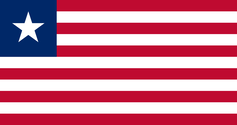 Flag of Liberia
Flag of Liberia he United Kingdom was the first country to recognize Liberia's independence. The United States did not recognize Liberia until 1862, after the Southern states, which had strong political power in the American government, declared their secession and the formation of the Confederacy. The leadership of the new nation consisted largely of the Americo-Liberians, who initially established political and economic dominance in the coastal areas that the ACS had purchased; they maintained relations with U.S. contacts in developing these areas and the resulting trade.
There was a decline in production of Liberian goods in the late 19th century, and the government struggled financially, resulting in indebtedness on a series of international loans. On July 16, 1892, Martha Ann Erskine Ricks met Queen Victoria at Windsor Castle and presented her a handmade quilt, Liberia's first diplomatic gift. Born into slavery in Tennessee, Ricks said, "I had heard it often, from the time I was a child, how good the Queen had been to my people—to slaves—and how she wanted us to be free."
Liberia remained neutral during World War I until August 4, 1917 upon declaring war on Germany. Subsequently, it was one of 32 nations to take part in the Versailles Peace Conference in 1919, which ended the war and established the League of Nations; Liberia was among the few African and non-Western nations to participate in both the conference and the founding of the League.
In the mid-20th century Liberia gradually began to modernize with American assistance. During World War II the United States made major infrastructure improvements to support its military efforts in Africa and Europe against Germany. It built the Freeport of Monrovia and Roberts International Airport under the Lend-Lease program before its entry into the Second World War.
After the war, President William Tubman encouraged foreign investment, with Liberia achieving the second-highest rate of economic growth in the world during the 1950s. The country also began to take a more active role in international affairs: It was a founding member of the United Nations in 1945 and became a vocal critic of the South African apartheid regime. As one of the few African nations to escape colonization, Liberia also served as a proponent both of African independence from European colonial powers and of Pan-Africanism, and helped to fund the Organization of African Unity.
In the late-20th century, tension between indigenous and repatriated-descended Liberians resulted in two civil wars and periods of military rule. Liberia became a pariah state because of its trade in "blood diamonds." In 2003, pro-democracy forces gained the upper hand and established a new democratic state.
 RSS Feed
RSS Feed